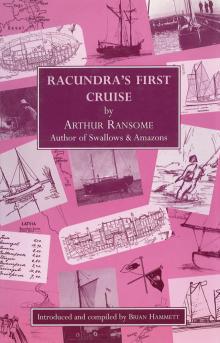- Home
- Arthur Ransome
We Didn't Mean to Go to Sea
We Didn't Mean to Go to Sea Read online
CONTENTS
Cover
Title Page
Map
Illustrations
Dedication
Epigraph
I: A BOWLINE KNOT
II: SLEEPY SKIPPER
III: “WE’VE ALL PROMISED”
IV: DOWN THE RIVER
V: SLEEPING AFLOAT
VI: “NOTHING CAN POSSIBLY HAPPEN”
VII: “HE’S BEEN AN AWFUL LONG TIME …”
VIII: THE BEACH END BUOY
IX: DRIFTING BLIND
X: OUT TO SEA
XI: WHOSE FAULT NOW?
XII: A CURE FOR SEA-SICKNESS
XIII: WOOLWORTH PLATE
XIV: AT PIN MILL
XV: KEEPING AWAKE
XVI: DAWN AT SEA
XVII: SHIPWRECKED SAILOR
XVIII: LAND HO! WHAT LAND?
XIX: SIGNAL FOR A PILOT
XX: GROWN-UP NOISES BELOW
XXI: SURPRISES ALL ROUND
XXII: IN A FOREIGN PORT
XXIII: DUTCH AFTERNOON
XXIV: HAPPIER VOYAGE
XXV: LOST! TWO DAYS AND A BOAT
XXVI: NOTHING TO DECLARE …”
XXVII: COIL DOWN
About the Author
Also by Arthur Ransome
The Arthur Ransome Society
The Authur Ransome Trust
Copyright
ILLUSTRATIONS
LANDING ON THE HARD
AMONG THE MOORED YACHTS
THE “BUTT AND OYSTER” AND ALMA COTTAGE
’SH! ’SH!
FIRST AID
CHART OF APPROACHES TO HARWICH
HARWICH LOOKED LIKE AN ISLAND
SHOTLEY PIER
INSIDE THE GOBLIN
MORNING DIP
JIM ROWED AWAY
GOODBYE TO ANCHOR AND CHAIN!
THE BEACH END BUOY
FENDING OFF WITH THE MOP
POINTS OF THE COMPASS
ALL BUT O.B.
NIGHT ENCOUNTER
PIN MILL
LIGHTSHIP AT NIGHT
THE LOOM OF A LIGHTHOUSE
COOKING AND STEERING
RESCUE AT SEA
ON THE CROSS-TREES
SIGNAL FOR A PILOT
AHOY! AHOY!
WHAT THEY SAW THROUGH THE PORTHOLES (I)
WHAT THEY SAW THROUGH THE PORTHOLES (II)
IN THE LOCK AT FLUSHING
TIED UP IN HARBOUR
THE MILK-CART
MEETING THE SAILING SHIP
ENTRANCE TO HARWICH
TURBANED NATIVE
To
MRS HENRY CLAY
LANDING ON THE HARD
“Grab a chance and you won’t be sorry for a might-have-been.”
COMMANDER TED WALKER, RN
CHAPTER I
A BOWLINE KNOT
JOHN WAS AT the oars; Roger was in the bows; Susan and Titty were sitting side by side in the stern of a borrowed dinghy. Everything on the river was new to them. Only the evening before they had come down the deep green lane that ended in the river itself, with its crowds of yachts, and its big brown-sailed barges, and steamers going up to Ipswich or down to the sea. Last night they had slept for the first time at Alma Cottage, and this morning had waked for the first time to look out through Miss Powell’s climbing roses at this happy place where almost everybody wore sea-boots, and land, in comparison with water, seemed hardly to matter at all.
They had spent the morning watching the tide come up round the barges on the hard, and envying the people who kept putting off to the anchored yachts or coming ashore from them. Then, in the afternoon, an old dinghy had been found for them, and now they were afloat themselves, paddling about, admiring the yachts in the anchorage.
It was getting on for low water. They had watched the falling tide leave boat after boat high, but, as Roger said, not exactly dry, on the shining mud. On the hard, men were walking round a barge that had been afloat in the middle of the day, and were busy with scrapers and tar-brushes. A clock chimed six from among the trees on the further side of the river. The river, wide as it was, seemed almost narrow between the bare mudflats, but a tug, fussing down from Ipswich, set the moored yachts rocking as it passed.
“Almost like being at sea,” said Titty.
“Gosh! I wish we were,” said Roger. “Which boat would you like to have?”
“The big white one,” said Susan.
“But look at her long counter,” said John. “I’d rather have one with a square stern, like a quay punt. Daddy says they’re twice as good in a seaway.”
“What about the blue one?” said Titty.
“Not bad,” said John.
“She’s got a proper capstan on her foredeck,” said Roger. “I wonder if she’s got an engine.”
“It’s the sails that matter,” said Titty.
“Yes, I know,” said Roger, “but all the same an engine’s jolly useful.”
John rowed a little harder to keep up against the tide.
“Now, for instance,” said Roger, “you’d be jolly glad if we had one.”
There was nothing to be said to that.
“What’s written on that buoy?” said Titty.
John glanced over his shoulder, and pulled harder to have a look. Close to them a black mooring buoy with green letters on it swung in the tide.
“Goblin,” said Roger. “Funny name for a boat. I wonder where she is.”
“There’s a boat coming up the river now,” said John, “but she may be going right up to Ipswich …”
“Her sails are a lovely colour,” said Titty.
AMONG THE MOORED YACHTS
A little white cutter with red sails was coming in towards the moored boats. Someone was busy on her foredeck. As they watched, they saw the tall red mainsail crumple and fall in great folds on the top of the cabin.
“There’s no one at the tiller,” said John.
“I say,” said Roger. “Is he all alone?”
“He’s gone back to it now,” said Titty. “He’s heading straight for us.”
“I bet this is his buoy,” said Roger.
“Look out, John!” cried Susan. “We’ll be right in the way.”
John pulled clear of the buoy, and watched, paddling gently so as not to drift down river. More and more slowly the little cutter came towards them. Staysail and mainsail were down. Only the jib was pulling, out on the bowsprit end. It certainly looked as if there were no one aboard except that big young man, whose shoulders were so broad that no one who had not seen his face would have guessed that he had only just left school to go to college. He was standing up, steering with a foot on the tiller, with his eyes on the buoy ahead of him. Suddenly, when he was still a few yards from it, they saw him stoop and then run forward along the side deck. The jib was flapping. The young man had grabbed the boathook and was waiting, ready to reach down and catch the buoy.
“He’ll just do it,” Titty said almost in a whisper.
“Beautifully,” said John.
“Oh,” gasped Titty. “He can’t reach it.”
Perhaps the ebb pouring out of the river was stronger than the skipper had thought. The wind had dropped. Under jib alone the little cutter had been moving very slowly. Now, with the jib flapping loose, she lost her way. Just as the young man reached down with his boathook she stopped moving. He made a desperate lunge for the buoy but the boathook was an inch too short. He tried again and missed it by a foot. Already the tide was sweeping her back.
“That’s done it!”
He was looking quickly round. There were moored yachts on all sides. He grabbed at his jib, but must have seen in a moment that he could not get his ship moving fast enough to save her fro
m drifting down on a big black boat lying astern.
“Hi! You!” he shouted. “Can you catch a rope and make it fast to that buoy?”
“Aye, aye, Sir,” shouted John.
“Sit DOWN, Roger,” cried Susan.
“Duck your heads,” said John.
A coiled rope was flying through the air, uncoiling as it flew. John caught it and gave the end to Roger. Three quick strokes brought their dinghy alongside the buoy, which had a rope becket on the top of it.
“Shove it through,” said John urgently… “A lot of it, and give me the end.”
“Aye, aye, Sir,” said Roger. He pushed the end of the rope through the becket and passed it back to John, who had pulled his oars in and was waiting with a loop in the rope. He took the end from Roger, passed it through the loop in the rope, round the rope itself and back again down into the loop, and pulled it taut all in a single movement.
“All fast,” he called, and hurriedly pulled the dinghy clear as the young man began hauling in hand over hand. In a moment the buoy was up on the foredeck, and the young man went on hauling in the buoy-rope, wet and thick and green with seaweed. A few yards short of the black boat the Goblin had stopped going astern. She was coming forward again.
“He must be jolly strong,” said Roger.
“I say,” said John, “she’s got a square stern.”
“Goblin,” said Titty, reading her name.
Breathlessly they watched. The end of a rusty chain was climbing out of the water. It went aboard over a fairlead at the stemhead. A yard … two yards … the Goblin’s skipper was making it fast. He stood there panting. Then he stooped, and pulled on something at his feet, and they saw the jib roll up on itself like a window blind. He stood up again, looking from boat to boat and then down at the four of them in the dinghy.
“Narrow squeak that was,” he said with a slow grin. “Jolly good work on your part. Who taught you to tie a bowline knot?”
“Father,” said John.
“He’s in the Navy,” said Roger.
“Lucky for me,” said the skipper of the Goblin. “I’d have been in a proper mess if you’d fumbled things just then.”
He stretched himself, dipped a mop over the side, used it to wipe his hands, black with mud from the mooring chain, and began to tidy up. John, with a steady stroke of his oars, was keeping close by. All four of them were watching. It was almost as if they had come home from sea themselves. They watched the skipper of the Goblin make the tiller fast. They watched him clamber forward again and turn the staysail into a neat sausage, drop it through the forehatch and disappear after it. They watched him come up again, not out of the forehatch but into the cockpit, lugging with him a huge pair of crutches, like big wooden scissors. He opened the crutches and stood them on the after-deck. Just as he went forward to lower the boom the crutches slipped. He came aft and balanced them once more.
BOWLINE KNOT
“Shall I come aboard and hold them steady?” said John trying not to sound as eager as he felt.
“Wish you would. Your dinghy’s got a fender round it? Have to look out for the paint.”
John, careful not to bump, laid the dinghy alongside. Roger and Susan hung on to the Goblin as he climbed aboard.
“Good,” said the Goblin’s skipper. “You can let her swing astern, so long as you keep her clear of the Imp.”
“That’s the name of his dinghy,” said Titty, looking at a tiny black pram dinghy that had been towing after the Goblin.
“Is she the Imp because she’s black?” whispered Roger, “or does he have her black because she’s an Imp?”
John, standing in the cockpit, was holding the crutches in place. The skipper at the foot of the mast was slowly lowering the boom. John guided it between the jaws of the crutches.
“Say when,” said the skipper.
“Now,” said John.
The end of the boom dropped another six inches into the jaws of the crutches, and John, hauling in the slack of the mainsheet, made it fast as the skipper came aft.
“Hullo,” he said, “you’ve been in a boat before.”
“We’ve only sailed very little ones,” said John. “By ourselves, I mean.”
“Let’s have those tyers. Starboard locker … Just by your hand.”
John found the bundle of tyers, like strips of broad tape. He joined the skipper on the cabin top. Together they pulled and tugged at the great heap of crimson canvas. “Hang on to this for a minute … Hold this while I get that lump straightened out … Pull this as hard as you can …” Gradually the mainsail turned into a neat roll along the top of the boom. Each bit, as they got it right, was tied firmly down.
“Hullo! Is that the last tyer? There ought to be one more.”
“Is this it?” An eager voice spoke from the cockpit. Roger, standing on one of the cockpit seats, had the missing tyer in his hand. Titty was in the cockpit, too, and even Susan, who had had doubts about it, had not been able to stay behind. You never knew what Roger might be doing, and she had thought it best to follow him.
“When did you come aboard?” said John. “I say, you don’t mind, do you?” he added, turning to the Goblin’s skipper.
“He said we were to let the dinghy go astern,” said Roger. “So we did.”
“The more the merrier,” said the young man. “Plenty of work for everybody. All those ropes on the cockpit floor to be coiled.”
He put on the last tyer and, followed by John, went forward to tidy up the foredeck.
“I say, just look down,” said Titty.
They looked down into the cabin of the little ship, at blue mattresses on bunks on either side, at a little table with a chart tied down to it with string, at a roll of blankets in one of the bunks, at a foghorn in another, and at a heap of dirty plates and cups and spoons in a little white sink opposite the tiny galley, where a saucepan of water was simmering on one of the two burners of a little cooking stove.
“Look here,” said Susan. “Hadn’t we better get on with those ropes. We oughtn’t to be here at all really. We’re going to be late for supper …”
One by one they disentangled the ropes from the mass on the floor of the cockpit, coiled each one separately and laid it on a seat. Meanwhile John and the skipper were busy on the foredeck, closing the hatch, coiling the buoy rope, throwing overboard handfuls of green seaweed, dipping the mop over the side, sousing water on the deck and sweeping the mud from the mooring chain away and out of the scuppers. In about ten minutes nobody could have guessed that the Goblin had only just come in from the sea.
“This water’s nearly boiling,” called Susan, who had been admiring the little stove.
“Turn off the juice,” the skipper called back. “Turn the knob to the right. No need to let the water boil. It’s only for washing up.” He was standing on the cabin top, reaching up to the screens on the shrouds, and presently John and he, one with a big red lantern and one with a big green, came aft to the cockpit.
“Well done,” he laughed, looking at the neat coils of rope. “Shove them into the lockers out of the way.”
“Sidelights?” said Roger.
“Yes. Empty, too. They burnt out this morning, but it was light enough then, so it didn’t matter. I ought to have brought them in, but forgot.”
“Gosh!” said Roger. “Were you sailing in the dark?”
“Left Dover two o’clock yesterday,” said the skipper of the Goblin.
“He’s been sailing all night,” said Roger. “Did you hear?”
“All by himself,” said Titty.
The skipper looked at his mainsail, at the halyards, at the decks. “She’ll do,” he said. “Now I’ll just get through the washing up. Rule of the ship never to go ashore with washing up undone. And then …” he yawned and rubbed his eyes … “I’ll see what the Butt can do for me by way of breakfast …”
“BREAKFAST!”
Susan, Titty and Roger all exclaimed together.
“But it’s nearly seven
o’clock. Haven’t you had anything to eat all day?”
“Biscuits,” he said. “And a thermos full of hot soup that I’d made before starting. But I never thought I’d be so long.”
“We’ll do the washing up,” said Susan. “It won’t take us two minutes.”
“Come on, then.” He stifled another yawn. “I never refuse a good offer.”
Down they went into the cabin, climbing down the steep steps of the companion, between the sink full of the things to be washed up on one side, and the stove in the little galley on the other.
“There’s an engine,” exclaimed Roger, looking in under the steps. “Look here, Titty, that’s my face.”
THE “BUTT AND OYSTER” AND ALMA COTTAGE
“Sorry,” said Titty, who had reached down with one foot and found Roger’s forehead with it instead of a step.
“Come along you,” said Jim. “Into that corner so that the others can come down. You can look at the engine afterwards.”
“I’m going to sit next to it,” said Roger.
Presently they were all in the cabin, sitting on the bunks, peering forward at two more bunks in the fore-cabin, looking at bookshelf and barometer and clock, at the chart on the table, and at a big envelope labelled “SHIP’S PAPERS.” The owner of the Goblin stooped down to reach into a cupboard under the galley. He brought out a handful of dish-cloths, emptied the saucepan into the sink, sloshed in some washing soda out of a tin, and then made room for Susan, while he put away the Ship’s Papers, cleared the chart off the table, and spread in place of it a wide strip of white, shiny American cloth. As fast as Susan washed the things they were dumped on one end of the table, seized by one of the wipers and, when dry, put at the other end.
“You people don’t belong to Pin Mill,” said the young man, who seemed to touch the roof of the cabin when he was standing up looking down at his busy helpers.
“We only came yesterday,” said Roger.
“Stopping long?”
“We don’t know yet,” said Titty. “But we probably are. We’ve come to meet Daddy. He’s going to be stationed at Shotley and that’s quite near.”

 Peter Duck: A Treasure Hunt in the Caribbees
Peter Duck: A Treasure Hunt in the Caribbees Racundra's First Cruise
Racundra's First Cruise Great Northern?
Great Northern? Swallowdale
Swallowdale Swallows and Amazons
Swallows and Amazons Winter Holiday
Winter Holiday Missee Lee: The Swallows and Amazons in the China Seas
Missee Lee: The Swallows and Amazons in the China Seas Pigeon Post
Pigeon Post We Didn't Mean to Go to Sea
We Didn't Mean to Go to Sea The Firebird and Other Russian Fairy Tales
The Firebird and Other Russian Fairy Tales Coot Club
Coot Club The Big Six: A Novel
The Big Six: A Novel Six Weeks in Russia, 1919
Six Weeks in Russia, 1919 Secret Water
Secret Water The Big Six
The Big Six Missee Lee
Missee Lee Peter Duck
Peter Duck The Picts and the Martyrs
The Picts and the Martyrs